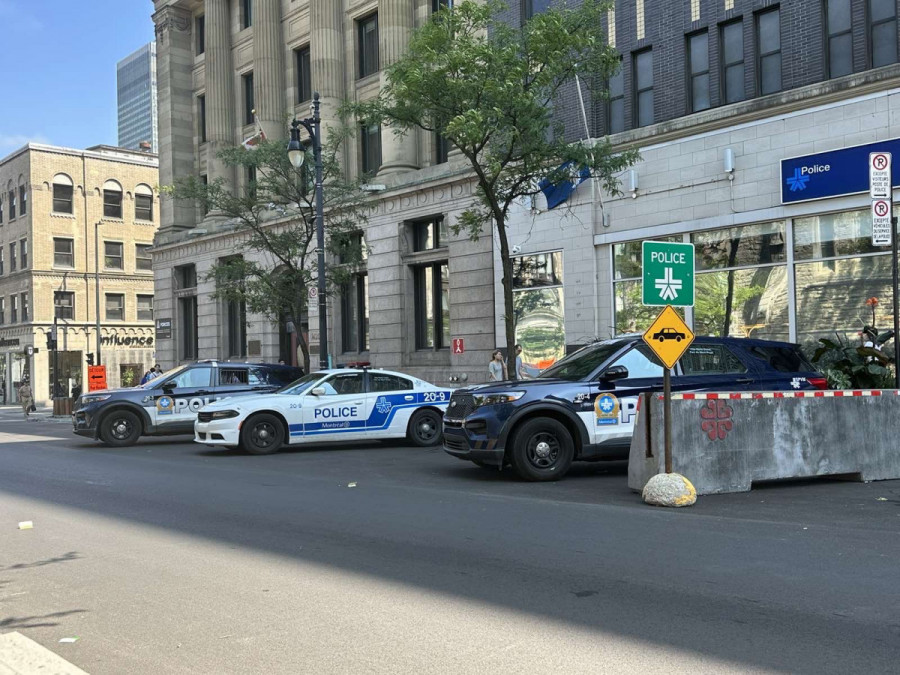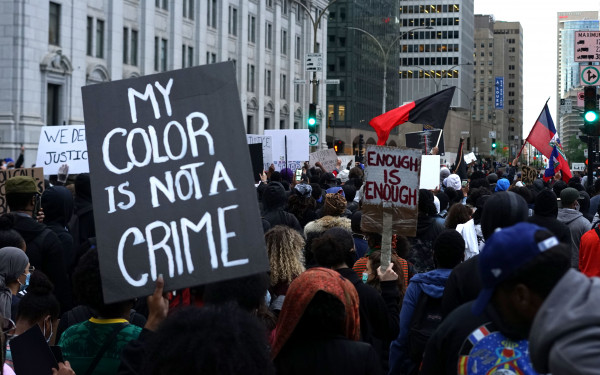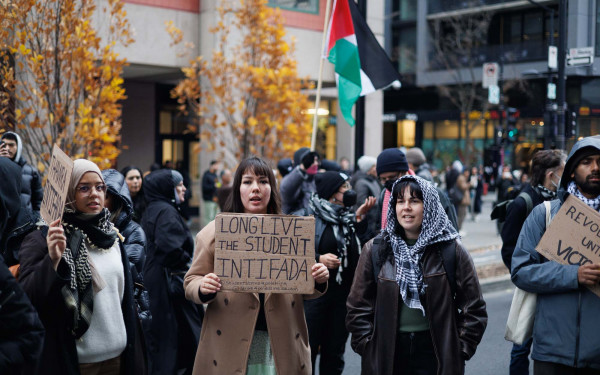Black and Indigenous Concordia students attacked by police
Systemic reforms needed to hold SPVM accountable, victims and advocates say
On July 22, at 3 a.m., two PhD Concordia students, Amaechi Okafor and Wade Paul, were walking home in the Notre-Dame-De-Grâce neighbourhood when they saw police cruisers on the road dealing with another case.
In order to not disturb them, the students went around the cars and returned to the sidewalk. They did not cross the road. Okafor said that they simply didn’t want to disturb the then-ongoing intervention.
A few moments later, a police cruiser climbed onto the sidewalk and parked on it, blocking the way forward for Okafor, who is Black, and Paul, who is Indigenous. They were quickly surrounded by eight police officers who were yelling in French, causing havoc.
“We’re being ambushed from behind, and we’re being yelled at,” said Paul. “This moment was super confusing. [The officers] were yelling over each other.”
After multiple demands to start speaking English, the officers asked both men for their identification. The two friends questioned why this was needed, and the police responded with “the act of asking is obstruction,” according to Paul. Immediately after, they were detained.
“They twisted my arm, threw me against the fence, spread my legs and raided my pockets,” Paul said. “They jammed handcuffs on me, leaving red marks on my wrists.”
According to Paul, while being searched, the police kept asking if he had needles in his pocket.
Okafor was detained in a similar forceful manner. “They pushed me forcefully on the fence, and spread my legs to the point of ripping my pants,” he said. He added that pain resurged from old knee injuries after the incident.
The officers placed the men into two separate cruisers, where they sat without any information for 20 minutes. The police searched and confiscated their phones, identification and wallets, which were later returned in a police evidence bag.
“It all happened so fast. It was really scary,” said Okafor. “It’s scary for me, as an international student, a Black student.”
Both men were released with two fines each totalling approximately $550, one for hindering a peace officer in the performance of duties and the other for jaywalking.
“I’ve never felt this way. No government or entity has the right to make me feel this way. Do I need to get shot for things to change?” — Ameachi Okafor
Police brutality has been a recurring concern over the last decade with racial profiling and violence towards minority groups on the rise in the city. According to a 2019 study conducted by Université TELUQ and Université de Montréal, “Indigenous people and Black people were four to five times more likely than white people to be stopped by police.”
Since 2019, the Montreal Gazette reported on over 19 recorded police brutality cases that targeted Black people. Cases continue to rise.
However, in order to see a change in how marginalized communities are treated by police, advocates say the SPVM needs to change.
Concordia professor Ted Rutland said that major structural changes are needed in order to protect BIPOC communities from unfair conviction.
“We just don't need the police to respond to 911 calls that have nothing to do with criminality. We don't need police responding to homelessness, involving mental illness, involving drug use,” Rutland said. “We can have community workers respond to those calls. It'll provide a much better level of care and service to people.”
“We need less police in the lives of people like these two men who are targeted because of their racial background,” he continued.
After their detainment, both men took time to process the events of the night. The incident has left a permanent mark on both victims. They feel like safety has become a luxury.
“I do feel unsafe and uncomfortable on the streets of Montreal,” said Paul. “I'm nervous around police cars as I'm walking the streets. I'm checking my shoulders, crossing sidewalks. It took a while to be able to start sleeping. It was a little bit of a challenge for the first couple of weeks,” he added.
Okafor echoed his statement saying he now feels unsafe in his own community. “I felt my pride taken away. I felt my humanity, my personhood, my identity taken away. I felt subjugated, felt oppressed. And that's a feeling I've never felt,” he said.
Okafor’s family is meant to arrive in Montreal soon from Nigeria. However, his concern for the safety of his wife and two kids has increased tenfold. His perception of Montreal as a safe city has been shattered.
While reflecting on the incident, Paul expressed his anger towards the police in the city.
“I hear this narrative that not all cops [are bad]. I think that's a sad narrative. We should have a discussion about one bad apple that is too many. I think there could be more accountability, more transparency,” Paul said.
According to Rutland, the process of healing the relationship between the community and the police force is more complicated than it seems. “ The police and the media continually convince us that if anything bad happens in the community, we just need more police or tougher sentences, less parole,” he explained. However, even with increasing police budgets, change doesn’t seem to happen.
Rutland added that the SPVM believes that through public relation efforts, the community will trust in the system once again. “Often [the police think] getting police officers to meet people from diverse backgrounds, in this sort of naive hope that like if they meet a Black person or Indigenous person or a trans person and realize that they're human beings... somehow that'll change police behaviour. But it's not an individual problem,” he continued.
Listening to communities rather than increasing police funding is a necessary step, Rutland argued. “We might think it's reasonable to hire 200 Black cops [...] that things will improve, but that's just not the way it works,” he said. “We need to spend a little time listening to people who've been in the struggle against the police for a little longer,” he added.
“I think it’s important that whoever is going to be reading this doesn’t take this [incident] as something that just happens,” Okafor said. “Having that idea is what is killing this city. If it’s happened before, it shouldn’t happen again. It shouldn’t be a recurring thing.” He agreed with Paul that there must be accountability for what occurred.
“I’ve never felt this way. No government or entity has the right to make me feel this way,” Okafor said. “Do I need to get shot for things to change?”
The Link contacted the SPVM, who declined to comment. In the email exchange, the police confirmed that the officers were not wearing body cameras, and are “awaiting guidance from the provincial guidance.” They also stated they would be “checking with the units concerned.”
Despite the push for their implementation, body cameras might not be the solution to the issue.
According to Rutland, body cameras might just cause more problems. “Having video evidence doesn't make any difference. There are just no consequences for even killing anybody. Not a single police officer has lost their job for killing someone in Montreal,” he claimed.
Fo Niemi, the executive director of the Centre for Research-Action on Race Relations, said that Okafor and Paul have filed complaints with Quebec's police ethics commissioner and the Human Rights and Youth Rights Commission and have contested the tickets.
He argued for individualized remedies and damages as well as larger, systemic remedies, like more mandatory training for officers and changing the way the police apprehend people.
This article originally appeared in Volume 44, Issue 1, published September 5, 2023.







